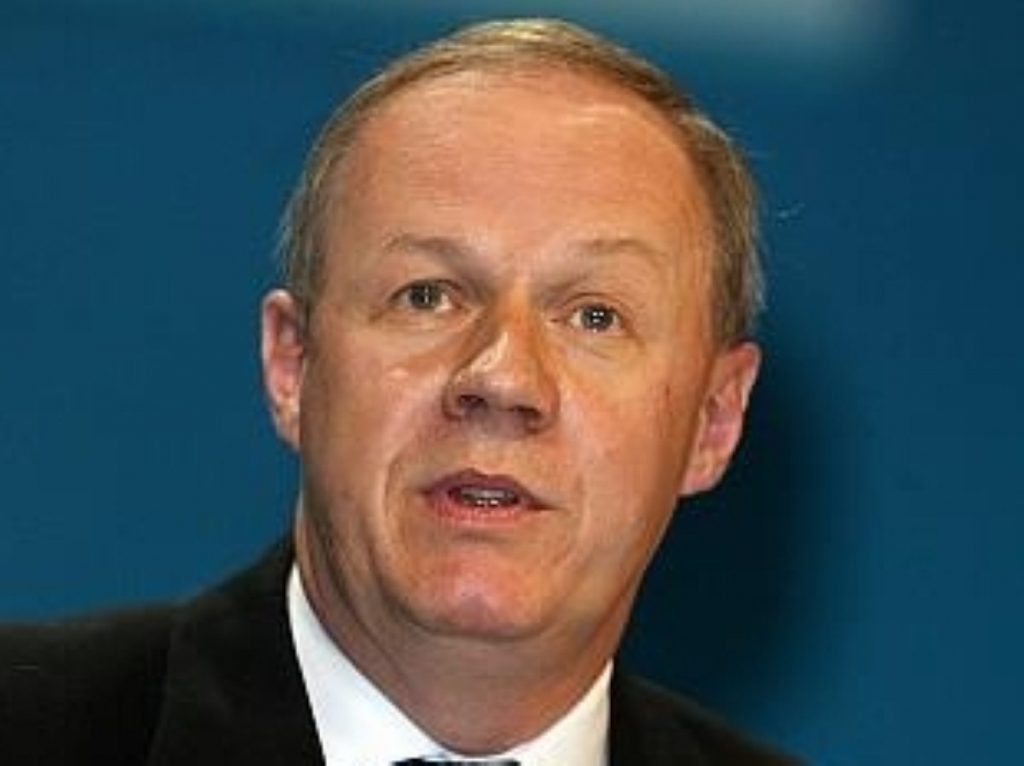No warrant issued for Green search
Commons speaker Michael Martin has sparked outage from MPs after admitting he was not told police planned to search shadow immigration minister Damian Green’s parliamentary office.
The speaker confirmed there was no warrant issued for the search, to loud gasps from MPs.
An angry House of Commons expressed frustration the government will set the terms of a debate on the arrest – announced by Mr Martin this afternoon.
The speaker told the Commons a committee of seven “senior and experienced” MPs would be appointed to investigate the arrest.


Mr Green, who was arrested last week on suspicion of conspiring to commit misconduct in a public office, told MPs he believes none of them are “above the law” – like “ministers, senior civil servants and the police”.
MPs outraged by the suspected breach of parliamentary privilege were audibly disturbed by the speaker’s admission that police were permitted to search Mr Green’s office and remove his computer and mobile phone without a warrant to do so.
He revealed parliament’s serjeant-at-arms had signed a consent form without consulting him and added he regretted that he was not fully informed.
“From now on a warrant will always be required,” he said.
“I must make it clear to the house that I was not asked the question of whether consent should be given or whether a warrant should have been insisted on. I did not personally authorise the search. It was later that evening that I was told that the search had gone ahead only on the basis of a consent form.”
Senior MPs made a series of impassioned points of order about the issue to a packed Commons chamber.
Former Conservative party leader Michael Howard pressed the speaker to ensure the motion on which the debate would take place would allow MPs “to question the conduct in this deplorable affair of government ministers, of civil servants and of the House authorities”.
Mr Martin responded by saying the government would table the motion, leading Mr Howard’s predecessor as opposition leader, Iain Duncan Smith, to question this decision.
“The executive themselves being in control of this motion are also party to the whole issue. my concern is that motion may well be drafted in such a way as to limit the scope of the debate,” he said.
“I think quite clearly I’ve given more than a hint of the type of motion I want laid down by the government,” Mr Martin responded.
Ex-Liberal Democrat leader Sir Menzies Campbell sought assurances that the seven-member committee would be entitled to have information from every source.
Former home secretary John Reid said it was important that the “independent operations of the police should be reasserted”.
And David Winnick called for the policeman at the centre of the case to be called to the Commons to explain his conduct.
Mr Green was arrested last week over alleged leaks of information from the Home Office.
The arrest of the Tory immigration minister provoked a constitutional crisis at the heart of government and in the upper echelons of the Metropolitan police.
A spokesperson for the Met confirmed that four addresses had been searched connected to Mr Green’s arrest.
But only three had been searched under warrant. The other, Mr Green’s Westminster office, was searched under written authority from the serjeant-at-arms in the form of the consent form.
Whether the serjeant-at-arms was aware she did not have to comply with the request and could have demanded a warrant was an issue for her employers, the Met spokesperson added.
The Conservatives have compared the arrest to a Robert Mugabe-style police state, and are working closely with the Liberal Democrats to discover what government figures knew about the arrest before it happened.
Opposition leader David Cameron told the Commons during the debate on the Queen’s Speech: “I hope there is something we can all agree on. Parliament is here to call government to account. isn’t that what the ceremony this morning is all about, when we slam the door? That is parliament doing its job.”
Gordon Brown and home secretary Jacqui Smith have categorically denied knowing anything, but refused to apologise for the arrest.
“I uphold the right of members of parliament to pursue their duties in a way that is necessary for the public interest,” Mr Brown told MPs this afternoon.
“I want to defend the operational independence of the police. You cannot pick and choose. You either support it or you don’t support it.”
Speaking on Wednesday, acting Metropolitan police commissioner Sir Paul Stephenson insisted it had been the police’s decision alone to arrest Mr Green.












